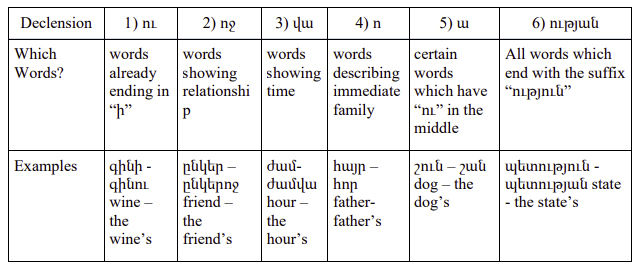Language/Armenian/Grammar/The-Genitive-Case
The genitive case is used to show possession. Its function is very similar to the functions of "'s" or "of" in English. It is important to memorize how the genitive case of nouns is formed, as the genitive form is used to construct other cases.
Most words become genitive by simply adding the letter "ի" at the end:
- Սա ուսուցչի գիրքն է։ This is the teacher’s book.
- Դա Արմանի գոտին է։ That is Arman’s belt.
However, there are also many words that form genitives in a different way. These words can be grouped into six categories:
Don't hesitate to look into these other pages after completing this lesson: Cases of Nouns, The Future Subjunctive Mood, Prepositions and Postpositions & Conditional Sentences.
The 6 Irregular Declensions[edit | edit source]
Below are commonly used nouns which take the “ ու” declension (for more commonly used words which take this declension)[edit | edit source]
| որդի | son | որդու | the son’s |
| կենդանի | animal | կենդանու | the animal’s |
| քեռի | mother’s brother | քեռու | mother’s brother’s |
| ընկերուհի | girlfriend | ընկերուհու | the girlfriend’s |
| ուսուցչուհի | female teacher | ուսուցչուհու | the female teacher’s |
- Նունեի որդու անունը Հայկ է: Noune’s son’s name is Haik.
In Armenian the ending “ուհի” is added to the noun to denote a female. For example: բժիշկ - doctor, բժշկուհի - female doctor, ընկեր - friend, ընկերուհի - female friend, մատուցող - waiter, մատուցողուհի - waitress etc. Like other words that end in “ի” such words receive the “ու” ending.
- Դա բժշկուհու մեքենան է։ That is the female doctor’s car.
Below are commonly used nouns which take the “-ոջ” declension[edit | edit source]
| կին | wife/woman | կնոջ | the wife’s/woman’s |
| քույր | Sister | քրոջ | the sister’s |
| բուժքույր | Nurse | բուժքրոջ | the nurse’s |
| աներ | a man’s father-in-law | աներոջ | the father-in-law’s |
| տալ | a woman’s sister-in-law | տալոջ | the sister-in-law’s |
- Նրա կնոջ անունը Արմինե է: His wife’s name is Armine.
Below are commonly used nouns which take the “վա” declension[edit | edit source]
| օր | Day | օրվա | the day’s |
| այսօր | Today | այսօրվա | today’s |
| վաղը | Tomorrow | վաղվա | tomorrow’s |
| գիշեր | Night | գիշերվա | the night’s |
| շաբաթ | Week | շաբաթվա | the week’s |
| ամառ | Summer | ամառվա | the summer’s |
| տարի | Year | տարվա | the year’s |
- Այսօրվա եղանակը շատ լավն է: Today’s weather is very nice.
- Վաղվա դասը դժվար է։ Tomorrow’s class is interesting.
Below are commonly used nouns which take the “ո” declension. Notice that the change here is inside the word and not to its ending[edit | edit source]
| մայր | Mother | մոր | mother’s |
| եղբայր | brother | եղբոր | brother’s |
- Այսօր իմ հոր ծննդյան օրն է: Today is my father’s birthday.
- Գարնան սկիզբը մարտի մեկն է։ The beginning of spring is March 1.
Below are commonly used nouns which take the “ա” declension. These words too undergo an internal change[edit | edit source]
| տուն | house | տան | the house’s |
| անուն | name | անվան | the name’s |
| դուռ | door | դռան | the door’s |
| գարուն | spring | գարնան | the spring’s |
| աշուն | fall | աշնան | the fall’s |
| մանուկ | child | մանկան | the child’s |
| աղջիկ | girl/daughter | աղջկա | the girl’s |
- Այդ աղջկա անունը Նունե է: That girl’s name is Noune.
- Ես սիրում եմ դռան գույնը։ I like the door’s color.
Below are commonly used nouns which take the “ության” declension[edit | edit source]
| նախադասություն | sentence | նախադասության | the sentence’s |
| հյուրասիրություն | hospitality | հյուրասիրության | the hospitatlity’s |
| պետություն | government | պետության | the government’s |
There is a general tendency to remove the last vowel from a word if you are adding another vowel to its end. This rule is not particular to the genitive case, but because we very often form this case by adding the vowel “ի” it does come into effect often.
| մարմին | Body | մարմնի | the body’s |
| ջուր | Water | ջրի | the water’s |
| գլուխ | Head | գլխի | the head’s |
All plurals of nouns disregarded of the declension in singular have regular declension.
| որդի | Որդու | որդիներ | որդիների |
| կենդանի | Կենդանու | կենդանիներ | կենդանիների |
| քույր | Քրոջ | քույրեր | քույերի |
| աներ | Աներոջ | աներներ | աներների |
| օր | Օրվա | օրեր | օրերի |
| ամառ | Ամառվա | ամառներ | ամառների |
| եղբայր | Եղբոր | եղբայրներ | եղբայրների |
| մայր | Մոր | մայրեր | մայրերի |
| պետություն | Պետության | պետություններ | պետությունների |
To convey the meanings of belonging to 1st person singular (mine) and 2nd person singular (yours) endings ս and դ may be added to the noun in nominative case. For example: ‘my mother’ can be translated both as իմ մայրը and մայրս. Or ‘your house’ can be translated both as քո տունը and տունդ.
Sources[edit | edit source]
https://slaviccenters.duke.edu/sites/slaviccenters.duke.edu/files/handbook_of_armenian.pdf
Other Lessons[edit | edit source]
- Adverbs
- The Future Perfect Tense
- Word Order
- present simple and present continuous
- Causative Verbs
- The Nominative Case
- Present Continuous Tense
- Plurals
- Asking Questions
- Obligatory Mood Future Obligatory


